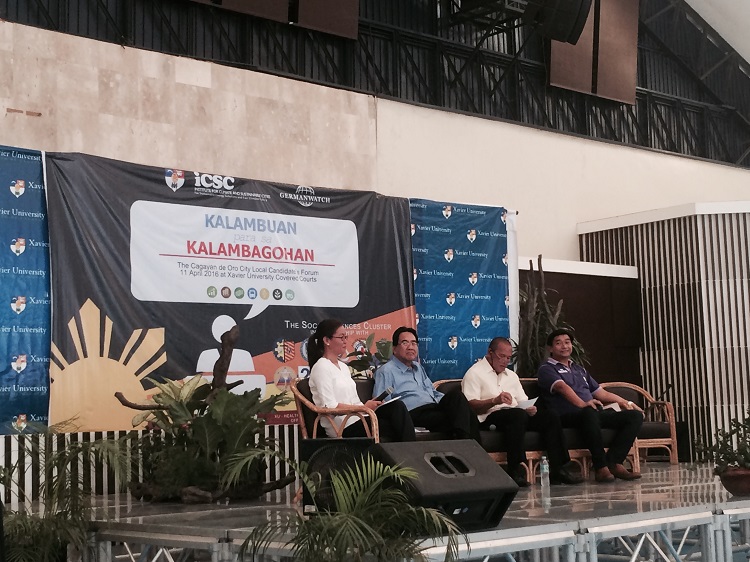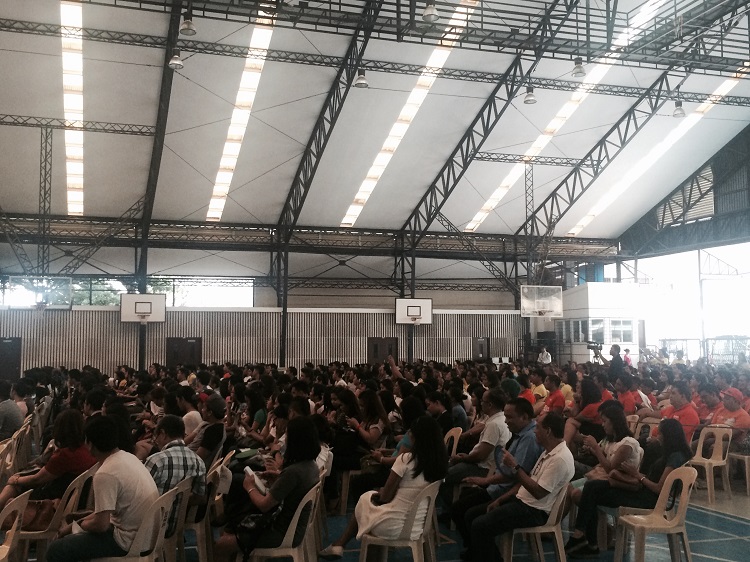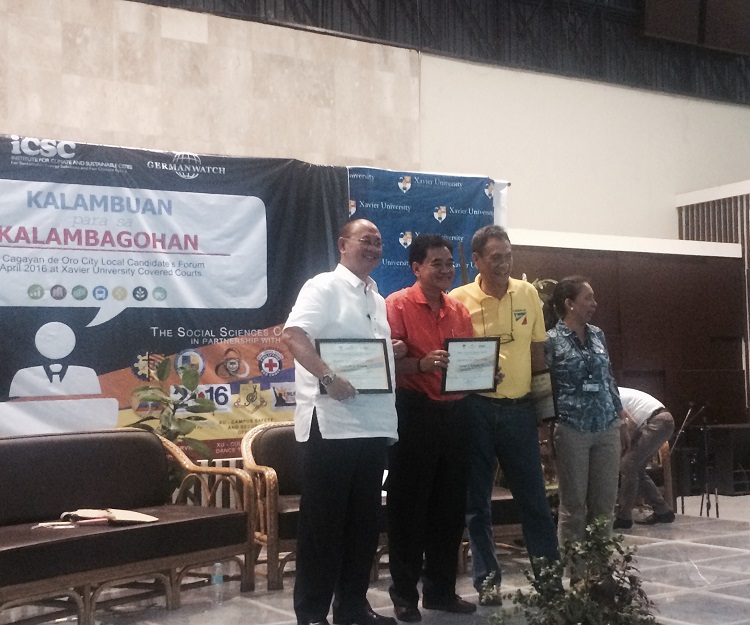
MAYORAL CANDIDATES. (L-R) Forum moderator XU-Economics professor Ma Kresna Navarro, CDO Second District Rep Rufus Rodriguez, incumbent CDO Mayor Oscar Moreno, and Councilor Ian Nacaya representing former Mayor Vicente Emano, participate in “Kalambuan para sa Kalambagohan: CDO Local Candidates Forum” at Xavier University on April 11, Monday.
By Stephen J Pedroza and Alyssa Michelle R Viado
Sustainable economic development that cares for the environment was the front burner issue during a forum on April 11 that had mayoral and congressional candidates confront the challenges of energy supply, revenue generation and climate change in Cagayan de Oro (CDO).
Speaking before an audience composed of non-partisan groups, supporters, media, and faculty, staff and students of Xavier University Social Sciences cluster, which together with GermanWatch and the Institute for Climate and Sustainable Cities, hosted the event, the mayoral candidates agreed on the issue of climate change and the need to put in place adaptation and mitigation measures, especially for the most vulnerable sectors, namely farmers, fisherfolk and the urban poor.
Incumbent Mayor Oscar Moreno emphasized the need to address the recurring power outages through the promotion of renewable energy in Mindanao.
“Coal is easier and cheaper to produce,” said Moreno, “but the question is, ‘When will investors in renewable power come?’”
He said that although there are already some groups expressing interest in renewable energy, the rehabilitation of the Agus and Pulangi hydropower complexes is the more practicable solution, but something that hinges on the national government.
The pressing issue surrounding the rehabilitation of these power plants is privatization and the transfer of control to foreign investors.
“We need to look for ways wherein our natural resources are not surrendered to foreigners, but that we can also attract investors,” Moreno said. “I hope that the next president of the country will seriously look into this.”
Second District Representative Rufus Rodriguez who is looking to unseat Moreno was more aggressive in his call for renewable energy, expressing strong opposition to fossil fuel power plants.
If elected mayor, “There will be no coal-fired and diesel power plants in the city,” Rodriguez declared at least twice during the forum.
Referencing his co-authorship of Republic Act 10174 creating the People’s Survival Act, Rodriguez said that his team will strengthen the Disaster Risk Reduction and Managament (DRRM) units and initiatives in every barangay in CDO to adapt to climate change. “We will declare CDO as a mining-free and a log-ban zone to help mitigate disasters in the region. We will also relocate those in geo-hazard, disaster-prone areas,” he added, intimating related bills he authored that are already in the Senate.
“It’s about time that the city has twice the minimum budget allocation for disaster risk reduction to have clear adaptation strategies at the barangay level,” he said.
The three other mayoral candidates who were invited but were unable to attend were Felix Borres Jr, Romer Cabildo and Ric Saarenas. But unlike these three, former City Mayor Vicente Emano who is seeking redemption in the City Hall sent City Councilor Ian Mark Nacaya as proxy to the forum.
Nacaya explained Emano’s absence to be because of a prior commitment in Butuan and assured the audience that, contrary to rumors of poor health, the 75-year-old Padayon Pilipino front-runner is in excellent condition to still attend to various electoral engagements. Nacaya also justified that Emano already confronted and debated Moreno and Rodriguez on two separate occasions. This did not bode well for some members of the media who wanted to hear Emano’s thoughts on the issues straight from the former mayor himself.
Nonetheless, speaking for Emano, Nacaya acknowledged that addressing climate change requires leadership at the highest level of the Philippine government and the United Nations.
“Given that climate change is an issue that cuts across all parts and levels of the government and the global community, there is a need for strong inter-governmental policy coordination,” Nacaya said, noting that Emano intends to strengthen the city’s policy on climate change should the former mayor be able to mount a successful comeback.
He added that, “There is an urgent need to educate our people to better understand climate change and its impacts, risks, vulnerability, adaptation and mitigation potentials at the local level” because knowledge gaps still exist despite the emergence of numerous studies and campaigns on climate change in the country in recent years.
In support of this goal, Nacaya bared that the Emano administration will create a local Climate Change Commission that would be responsible for formulating and implementing development strategies to mitigate the impact of climate change in the city.
“Emano’s administration will be at the forefront in urging and seeking help from academic institutions and civil society organizations to help uplift the conditions of the poor especially the farming and fisherfolk sectors,” Nacaya assured.
Nacaya, who is seeking reelection, also said that Emano plans to promote the cultivation of heat-resistant crop varieties and sound agricultural practices, to set up early warning systems for extreme weather events and health outbreaks, to provide additional livelihood opportunities for small-scale farmers, and to introduce climate-proofing in public infrastructures, among others.
He elaborated that Emano started the partnership with the Department of Agriculture and the Bureau of Fisheries and Natural Resources for technical and funding support for fisherfolk and farmers in the upland barangays affected by calamitous events, which has been continued by the current administration.

KAGAY-ANON CROWD. Speaking before an audience composed of non-partisan groups, supporters, media, and faculty, staff and students, local candidates agreed on the issue of climate change and the need to put in place adaptation and mitigation measures, especially for the most vulnerable sectors.
Not a debate, but…
Although organizers of the forum were quick to point out that the meeting of the candidates was not intended to be a debate, the three contenders couldn’t help calling on each other’s supposed shortcomings.
Rodriguez’s proposal to operate a city college, which will be housed at the Cagayan de Oro National High School and conduct instruction after the high school classes in the afternoon, was criticized by Moreno as handsome only in words.
“It’s very attractive to say that you want to build a city college,” quipped Moreno who claimed to have done similar efforts when he was governor of Misamis Oriental. “The problem is the quality of graduates, and with the problem of quality comes the problem of employability,” the mayor said.
Moreno instead wants to focus on partnering with higher education institutions to form a consortium that will allow the sharing of faculty members, especially those who will not have enough teaching load with the introduction of the K-12 Basic Education program this June. “We will hold instruction in the high schools,” said Moreno. “What’s important is the support for education.”
Rodriguez reacted that city colleges like the Pamantasang Lungsod ng Maynila and the University of Makati have produced top graduates and have their own areas of excellence.
“If you have a defeatist attitude, success is not likely to come,” he retorted.
Apart from a city college to be housed at the city high school, Rodriguez also wants to open the same at the Lumbia National High School to cater to students from the hinterland barangays.
“The problem is the lack of concern for the poor,” Rodriguez furthered.
Nacaya shrugged off the heated exchange of the incumbents, saying that Emano has already accomplished what for the other candidates are still merely plans and ideas. He said that Emano introduced ladderized education during his administration, citing agreements with schools like the Mindanao University of Science and Technology to allow young people to study technical courses.
Rodriguez and Moreno were also at cross-purposes with each other when it came to the JR Borja Hospital.
The 2nd District Representative wants to nationalize the city hospital to improve its services to the public. According to Rodriguez, the city government cannot afford to buy medical equipment, such as Computed Tomography (CT) scan, Magnetic Resonance Imaging (MRI) and dialysis machines, and thus needs the help of the national government to modernize the said hospital.
“Many other hospitals have been nationalized even after the devolution of powers in the Local Government Code because the Department of Health has more money to buy equipment,” Rodriguez explained.
He boasted the 26 health centers modernized under his term as the 2nd District Congressman of CDO. He plans to do the same in the 1st District should he be elected mayor.
“We should be able to bring services from the City Hall to the communities,” he said. “Our people get sick but health centers do not have medicines.”
Moreno, however, held an opposing view. He maintained that the case of the city hospital is unlike other hospitals in the country that have been nationalized despite devolution because those hospitals were situated far from the regional hospitals.
“We don’t need to nationalize the JR Borja Hospital,” remarked Moreno. “What is needed is to provide steady improvements to the city hospital and health centers. Although these improvements are small, in time they will grow big.”
He went on to explain that “The philosophy of the local government is to be self-reliant and not depend on the national government.”
The banter between the two candidates did not end there. Rodriguez questioned the commitment of Moreno to peace and order. Citing national figures, the congressman said that CDO is number 5 in the country in index crimes and number 1 in Northern Mindanao in illegal drugs. He also mentioned the recent incidence of ambush and robbery in broad daylight. These, according to Rodriguez, contribute to the problem of business confidence in CDO.
“The mayor has operational control of the police,” said Rodriguez, “but he has a quarrel with the city council so no motorcycles and police cars have been turned over to the police.”
“We cannot guarantee zero criminality,” defended Moreno, “but the record of Cagayan de Oro is good. There are three patrol cars lined up to be turned over.”
He added that the city has managed to improve local revenue without raising taxes, increasing it from P2.122 billion in 2014 to P2.447 billion in 2015.
“This is the reason why CDO is one of the most competitive cities in the country,” Moreno said.
Although he conceded that much of the revenue has not been spent because of a lack of appropriation by the city council with which he has a standoff. Majority of the members of the city council are aligned with Emano’s party.
“We have tried them,” asserted Rodriguez, alluding to the administrations of Emano and Moreno, whom he said have failed to provide solutions to the worsening problems of traffic and index crimes. “There is a need for change.”
For Moreno, what is important is to build on the good practices of the local government units. “Cagayan de Oro must provide the leadership,” he said. “It’s easy to talk, but let’s look at the candidates’ track records.”
Nacaya seemed unmoved by the spat of the two candidates, talking up Emano’s record for providing financing, relocation and housing to the poor instead.
“Mayor Emano is the best leader who has delivered the most services to the poor and the helpless,” he said matter-of-factly. “We expect not only Mayor Emano to win, but also for the party to get a straight slate in the city council.” 
CONGRESSIONAL RACE. (L-R) City Councilor Ramon Tabor, Maxie Rodriguez, and Edgar Cabanlas are vying to be the representative of the Second District of Cagayan de Oro City in Congress.
Congressional candidates speak
Rodriguez is in his last term as representative of the 2nd District of CDO and is hoping to give up his seat for younger brother Maxie.
The younger Rodriguez is currently the partylist representative of Abante Mindanao. He agrees that hydropower resources must be developed to bring down energy cost, and hopes to pass a law that will integrate climate change in the school curriculum. Alongside that, he plans to send leaders to a climate change academy to train them in disaster risk management, and to reforest 3,000 hectares of land.
Edgar Cabanlas, who is challenging the bid of Rodriguez in Congress, lamented the loose implementation of environmental laws in the country.
“The Philippines is not bereft of laws when it comes to the preservation of the environment,” he said. “The problem is we cannot see good implementation, hence we cannot see good results.”
He avowed to remove questionable provisions in our environmental laws and strengthen the good ones but did not elaborate further.
Cabanlas also broached the idea of a rapid bus system that will run on electricity as a way of streamlining the city’s mass transportation system.
“We have to look for ways to overcome the challenge of climate change,” he said.
Part of his agenda is to promote urban agriculture and encourage the planting of vegetables and other food crops in people’s backyards to help achieve a balanced and sustainable food supply.
City Councilor Ramon Tabor rounded up the congressional candidates at the forum. He likewise pointed out the weak implementation of the Solid Waste Management Law, and blamed improper waste disposal from the level of the households to the business sector for polluting and clogging up the city’s drainage systems.
Tabor proposed to delegate the responsibility of garbage collection to the barangays. “So they can be directly accountable for the cleanliness of their communities,” he said.
The councilor also bemoaned the lack of green spaces. “Parks are being cemented, instead of promoting a green city,” he said, noting that he authored an ordinance prohibiting open spaces in subdivisions from being converted to serve other purposes.
He also raised the need for urban planning, green architecture, and local tourism that does not neglect the city’s history and culture.
All three candidates called for a stop to contractualization as a violation of workers’ right to security of tenure as guaranteed in the Labor Law. They also espoused the promotion of small and medium enterprises (SMEs) as drivers of economic growth.
“Our concentration is on foreign investments, but growth should also emanate from the grassroots communities,” Tabor said, adding that “their growth will contribute to the growth of the country."
Rodriguez was quick to say that while SMEs should be encouraged to flourish, they should be environmentally compliant as well.
Cabanlas added that incentives should be given to small businesses that comply with environmental laws and share in mitigating climate change.
“Let’s not give them the run around,” said Cabanlas, referring to micro-entrepreneurs applying for business registration and renewal.
Cabanlas, who is Moreno’s party mate, flaunted the Blue Certification Award conferred by Ombudsman Conchita Carpio Morales on the local government of Cagayan de Oro for addressing bureaucratic red tape issues through an automated business one-stop shop.
Three other congressional candidates for the 2nd District — Celso Balat, Evangeline Carrasco and Chito Fernandez — were invited to the forum but declined to attend.
Also notable was the absence of incumbent 1st District representative and reelectionist Rolando Uy who was expected to face off with lone challenger Councilor Candy Darimbang.
Darimbang expressed dismay over the non-attendance of Uy.
“I had hoped my opponent would be here so I could ask him questions about certain concerns in the city, being the incumbent,” she said.
The councilor also expected to interact with students, but ended up taping her message for airing on a local cable channel instead because of time constraints and the absence of Uy.
Darimbang’s platform includes establishing a district hospital and state-owned college, pushing for the Mindanao Railway System with an office in Cagayan de Oro, augmenting and modernizing farming, providing livelihood programs for women, and affording public utility vehicle drivers with health and accident insurance.